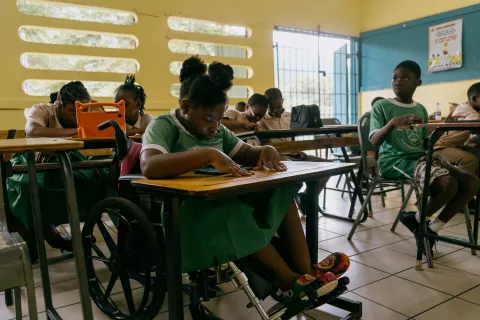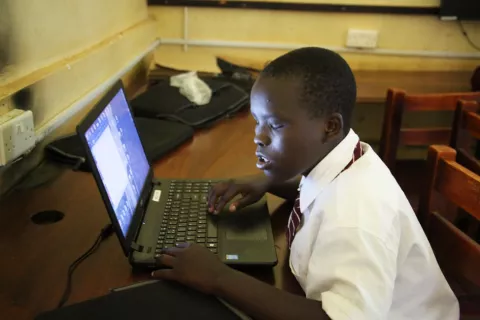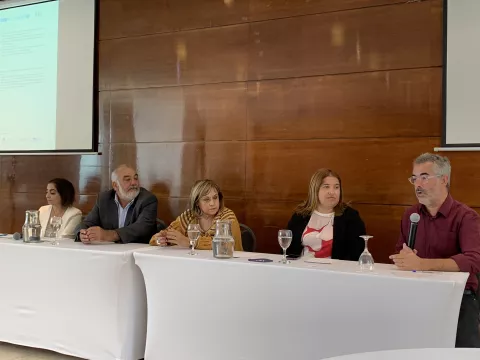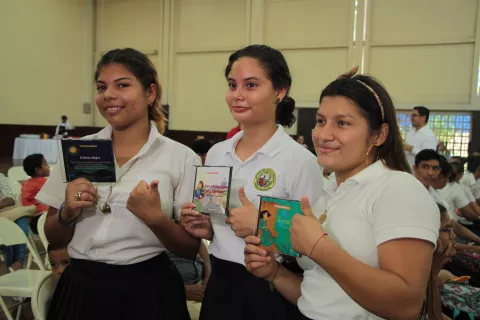Consultations with partners and disability experts
Landmark workshop to agree on user requirements for accessible digital textbooks

Consultations with partners and disability experts
Since 2014 and building on existing progress enabled by the Marrakesh Treaty to Facilitate Access to Published Works for Persons Who Are Blind, Visually Impaired, or Otherwise Print Disabled, UNICEF has been conducting wide-ranging consultations on accessible digital textbooks, involving education and technology experts, software developers, publishers and OPD, among others. UNICEF has established solid partnerships around this initiative to advocate for and create the basis for advancing the development of accessible textbooks. Efforts have included:
Work on content adaptation
A scoping exercise and several consultations took place with key stakeholders to create the basis for the initiative’s implementation within countries’ educational systems. As a result, UNICEF began to identify funding and technical partners to build the foundations for the initiative. Four regional workshops were held, in Argentina, Brazil, Paraguay and Uruguay, to create and develop guidelines for the production of accessible textbook adaptations. Each workshop focused on a specific type of function (hearing, sight, intellectual/developmental acuity and learning) as well as mother-tongue and second-language access. Inclusive education specialists, technologists, OPD members, MOEs and learners with disabilities participated in this activity with the support of UNICEF Headquarters, regional offices and the respective country offices. While the initiative initially focused on how students with specific disabilities learn, it has evolved to include a UDL approach that addresses how learners perceive and communicate information differently.
The four workshops generated initial guidelines on the basic aspects to consider when teachers are designing or adapting textbooks for students with different learning needs. They also helped to create the first accessible textbook prototype, developed in Brazil. Subsequently, three global technical meetings were held to review the first draft of the guidelines and advise experts on ways to produce, pilot and implement accessible digital textbooks in low- and middle-income countries. Feedback from all the consultations has been incorporated in a second accessible textbook prototype that currently serves as the basis for the guidelines now being tested and validated.
Feedbacks from all consultations have been incorporated in a second prototype, now tested and validated through the pilots.
Work on technology development
UNICEF is working with several partners to extend the accessibility of existing publishing standards to a broader population. In line with UDL principles, this innovation will allow authors, content creators and publishers to develop and enhance their own accessible digital textbooks but, more importantly, it will allow parents, teachers and students to choose, combine and synchronize different features, such as narration, sign language, interactivity and the audio descriptions of images, into customized textbooks for a specific user.
As a result of UNICEF and its partners’ influence and leadership under this initiative, the shift from disability-specific learning towards UDL is increasingly being considered by technical partners, governments and donors involved in the use of technology for learning. Supported by this document, this model is currently undergoing validation and testing by MOEs in several piloting countries. The initial lessons show that a user-centred experience that follows UDL principles combined with an understanding of learning styles in the content adaptation process can improve outcomes in all learners and is more inclusive for learners with disabilities in a wider range of contexts.
UNICEF is investing in developing a framework that includes system capacity-building, open-source technical support to the digital publishing community and the piloting of programmes in selected countries to promote inclusive education through access to technology. By innovating together with the community involved in the use of technology for learning, the goal is to increase the adoption of the key features necessary for the development and consumption of universally designed accessible textbooks. To increase the wide-scale adoption of these features by MOEs and publishers, UNICEF is also advocating and convening actors around the initiative.
Experts workshop in Rio de Janeiro, Brazil - August 1 - 3, 2017
Goal: Review and update the protocols developed with Brasil, Uruguay, Argentina and
Paraguay specialists, with a particular focus on hearing and with intellectual/developmental and
learning disabilities.



Experts Workshop in Washington, DC - 26 - 28, September 2017
Goal: To harness appropriate teaching/learning materials and technology support to ensure all children, including children with sensory and intellectual disabilities have the same access to textbooks and to learning materials.







